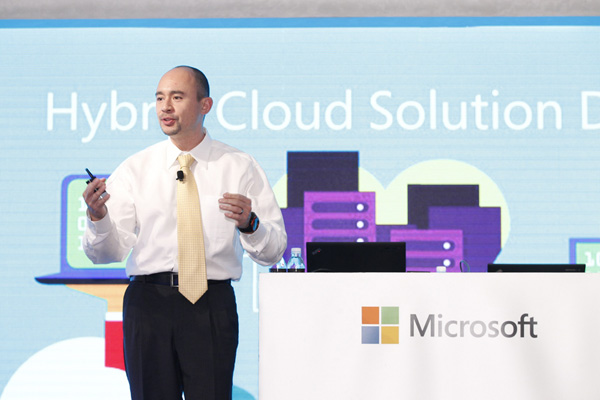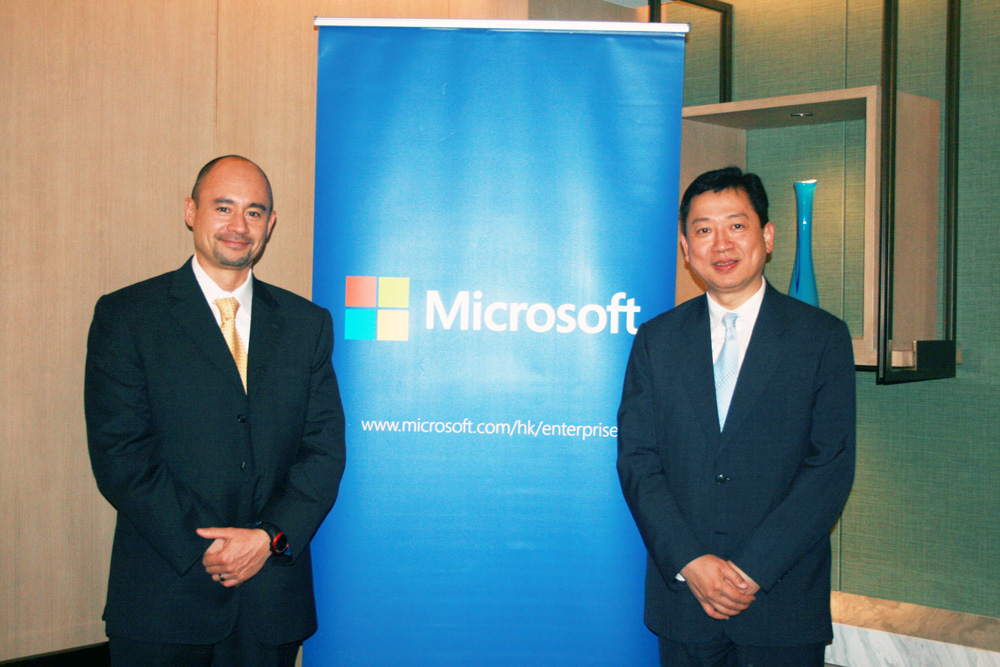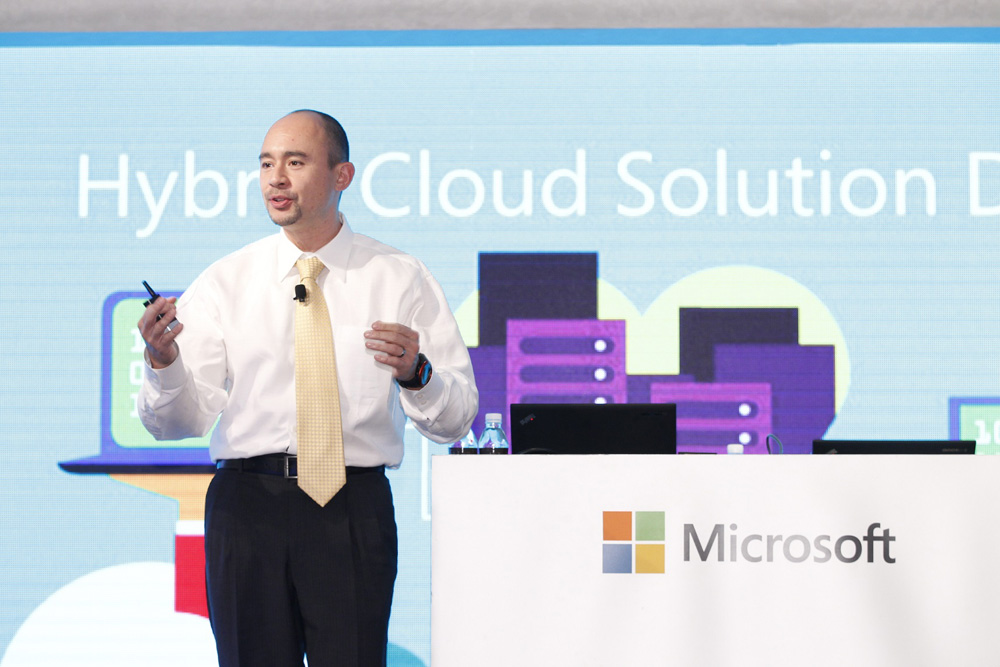Sun Hung Kai Properties migrates to Microsoft’s cloud OS and virtualization solutions with improved agility and flexibility to drive business to even greater success
Hong Kong, December 6, 2013 – Microsoft Hong Kong today announced a wave of new cloud products and services to enable companies to seize the opportunities of cloud computing and overcome today’s top IT challenges. Complementing Office 365 and other services, these new cloud offerings will help companies of all sizes better leverage the modern cloud technologies – both public and private cloud – available today and explore new business opportunities.
Eugene Saburi, General Manager, Cloud OS Marketing, Microsoft said, “As enterprises move to the cloud they are going to bet on vendors that have best-in-class software-as-a-service (SaaS) applications, operate a global public cloud that supports a broad ecosystem of third party services, and deliver multi-cloud mobility through true hybrid solutions. If you look across the vendor landscape, you can see that only Microsoft is truly delivering in all of those areas.”
“We can see more and more customers are migrating to cloud, and many organizations are also coming to the realization that the hybrid cloud model is becoming the model that best fit their needs. The launch of this new wave of cloud services in Hong Kong gives our customers clear options in solutions that meet their fast changing and varied business demands. The new offerings are more scalable, secure and are even easier to manage than ever before,” said Joelle Woo, Marketing and Operations Director of Microsoft Hong Kong.
 |
| Eugene Saburi, General Manager, Cloud OS Marketing, Microsoft, introduced a wave of new cloud products and services to enable companies to seize the opportunities of cloud computing and overcome today’s top IT challenges. |
| Downloads: Web | Print |
Microsoft’s cloud momentum in Hong Kong
In Hong Kong, the growth of cloud services is promising. IDC1 predicts that spending on public cloud services in Hong Kong will grow from US$251m in 2013 to US$685m in 2017.
There has been strong growth and momentum in Microsoft’s cloud business in Hong Kong. Microsoft has continuously invested to strengthen its ability to deliver cloud services to organizations of all sizes, and it is investing several hundred millions in US dollars to expand Windows Azure in the Asia over the next two years with additional datacenters in Australia, China and Japan. Chris Morris, AVP for Cloud Services of IDC commented, “Use of the Azure platform in Hong Kong is growing strongly, with many partners joining the Azure ecosystem and expanding the range of available services.”
In Hong Kong, Windows Server business continues to be growing as the preferred OS platform for virtualized hosts at 83% share for past four quarters (Q3 2012 – Q2 2013), with an increase of 6% and a 13% increase for Hyper V share in the same period.
Sun Hung Kai Properties enjoys greater agility and flexibility with Microsoft’s cloud solutions
One of Microsoft’s key cloud customers in Hong Kong is Sun Hung Kai Properties. Sun Hung Kai Properties is a leading listed corporation based in Hong Kong which focuses on the development of properties for sale and investment. Due to the increasing size of its workforce and the magnitude of its business development, there is a demand to expand its existing IT infrastructure to cloud for better agility and flexibility so as to cope with its business growth especially in regard to the significant turnover of properties sales and leasing, and meeting the new regulatory requirements of properties sales.
“With this ever-changing market environment, we are in need of a hybrid cloud infrastructure which enables us to enjoy the best of both worlds. Private cloud solution allows resources pooling and fast provisioning for new projects and offers robust business continuity especially in the special circumstances of disaster recovery,” said Richard Lam, Head of Information Technology of Sun Hung Kai Properties. “Considering the increasing need of sharing new property information with the public, we also look for a public cloud solution which can offer agility and reliability to meet the business needs.”
After evaluating different cloud solutions, Sun Hung Kai Properties decided to deploy Microsoft’s cloud OS including Microsoft Windows Server 2012 R2 with Hyper-V for its private cloud infrastructure and Windows Azure for hosting its public cloud, as well as System Center 2012 R2 as a consistent console for cross-cloud management.
Lam added, “Microsoft’s cloud solutions offer rich functionality with many new capabilities such as diagnostic monitoring of mission critical applications and automated disaster recovery. This simplifies our disaster recovery processes and helps meet the 4-hour requirement of our internal service level agreement (SLA). Combined with the resources pooling benefit of private cloud, we can now shorten the time for deploying new services and applications from traditionally two months to only one day.”
Sun Hung Kai Properties also evaluated other virtualization solutions, for instance VMWare. “The issue with VMWare is that they do not have consistent and integrated management suite to manage public cloud, private cloud, hybrid cloud, virtualization, physical servers and apps. Also, it requires additional Microsoft’s Windows Server and System Center licenses to offer the same functionality that Microsoft’s cloud solutions can provide, thus incurring a higher implementation costs and total cost of ownership.”
“Adopting Microsoft’s cloud solutions, Sun Hung Kai Properties is able to streamline our resources including reducing physical servers by 70% from previously 5 racks to only 1.5 racks, saving the company a considerable amount of space, power cost and maintenance overhead. With Microsoft’s cloud OS and virtualization solutions, there is no need for two separate support teams.”
“We started to deploy Windows Azure since July 2013 for sharing property information to meet the sales cycles of new property development. We expect to complete the deployment of Microsoft Windows Server 2012 R2 and System Center 2012 R2 by December 2013 and complete the integration of private and public cloud infrastructures around February 2014, so as to fully benefit our organization with the advantages modern cloud can bring us.” added Mr. Lam.
Hybrid infrastructure and modern applications
To help customers build IT infrastructure that delivers continuous services and applications across clouds, Microsoft has released Windows Server 2012 R2 and System Center 2012 R2. Together, these new products empower companies to create datacenters without boundaries using Hyper-V for high-scale virtualization; high-performance storage at dramatically lower costs; built-in, software-defined networking; and hybrid business continuity. The new Windows Azure Pack runs on top of Windows Server and System Center, enabling enterprises and service providers to deliver self-service infrastructure and platforms from their datacenters.
Building on these hybrid cloud platforms, customers can use the new Visual Studio 2013 and .NET 4.5.1 to create modern applications for devices and services. As software development becomes pervasive within every company, the new preview Studio 2013 Modern Lifecycle Management solution helps enable development teams, businesspeople and IT managers to build and deliver better applications faster and easier.
 |
| (From left to right) Eugene Saburi, General Manager, Cloud OS Marketing, Microsoft and Richard Lam, Head of Information Technology of Sun Hung Kai Properties explained how the Group is benefited by Microsoft’s cloud solutions. |
| Downloads: Web |
People and devices in the cloud
The proliferation of cloud applications, data and consumer devices is moving many enterprises to a bring-your-own-device model. The new release of Windows Intune combines with System Center Configuration Manager to help IT departments give mobile employees security-enhanced access to the applications and data they need on the Windows, iOS and Android devices of their choice. This unified management environment for PCs and mobile devices complements the new access and information protection capabilities in Windows Server 2012 R2.
Furthermore, with Windows Server 2012 R2, Microsoft is introducing the Microsoft Remote Desktop app to provide easy access to PCs and virtual desktops on variety of devices and platforms, including Windows, Windows RT, iOS, OS X and Android.
Enabling enterprise cloud adoption
Recognizing that most enterprises will take a hybrid approach to cloud, Microsoft wants to help customers utilize their investments in on-premises software solutions toward the adoption of cloud computing. On November 1, Microsoft will offer Enterprise Agreement (EA) customers discounted Windows Azure prices, regardless of upfront commitment, without overuse penalties and with the flexibility of annual payments.
Software as a service business solutions
The next major version of Microsoft’s CRM solution, Microsoft Dynamics CRM Online Fall ’13 is now available, helping make customer interactions more personal via contextual information for deeper insights on a variety of devices2. The on-premises version is expected to be available later in the fall for in-house deployment or partner hosting deployment. More information is available here. In addition, Microsoft Dynamics NAV 2013 R2 is available today, offering small and midsize businesses interoperability with Office 365, full multitenant support, and a range of tools designed to support large-scale hosting of the application on Windows Azure.
1 Source: IDC Worldwide Cloud Black Book 2013
2 Devices include Windows 8 tablets and iPad tablets with Microsoft Dynamics CRM 2013; Windows Phone 8, iPhone and Android phone shortly following the release of Microsoft Dynamics CRM 2013
###
About Microsoft
Founded in 1975, Microsoft (Nasdaq “MSFT”) is the worldwide leader in software, services and solutions that help people and businesses realize their full potential.




